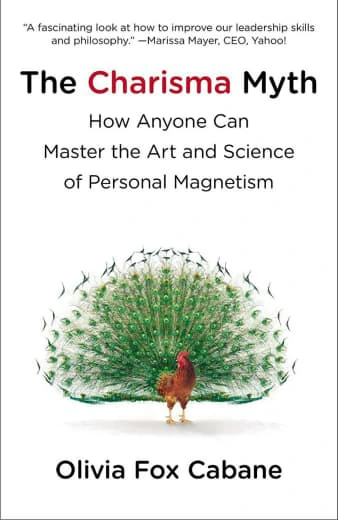The Charisma Myth: How Anyone Can Master the Art and Science of Personal Magnetism
The charisma myth is the idea that charisma is a fundamental, inborn quality—you either have it (Bill Clinton, Steve Jobs, Oprah) or you don’t. But that’s simply not true, as Olivia Fox Cabane reveals. Charismatic behaviors can be learned and perfected by anyone.
Drawing on techniques she originally developed for Harvard and MIT, Cabane breaks charisma down into its components. Becoming more charismatic doesn’t mean transforming your fundamental personality. It’s about adopting a series of specific practices that fit in with the personality you already have.
The Charisma Myth shows you how to become more influential, more persuasive, and more inspiring.
Review
—Dr. Tina Seelig, Executive Director for the Stanford Technology Ventures Program (STVP), the entrepreneurship center at Stanford University’s School of Engineering, and author of inGenius: A Crash Course on Creativity .
“Olivia Fox Cabane offers hands-on advice and a practical guide to humanizing leaders without comprising integrity or authority. She focused on the ‘it’ factors that can make a real difference.”
—Laura Lang, CEO, Time Inc.
“Cabane has done us a big favor. She’s woven solid science and engaging narrative into an instructive treatment of the role of charisma in leadership—a topic that (until now) we only poorly understood.”
—Robert B. Cialdini, author of Influence
“If you are interested in increasing your ability to be charismatic in your unique setting or employment, this book will give you direct skills to use.”
—Psychology Today
“The Charisma Myth is an easy read, effectively integrating stories and research, strategies and applications, techniques and practices.”
— New York Journal of Books
“We can’t all be as charismatic as Alexander the Great or Madonna, but with Cabane’s help, we can sure get close!”
—Marshall Goldsmith, author of Mojo
About the Author
Review
One of the core messages of this book is that you have to feel the emotions you want to project. If you’re feeling anxious or generally negative, as the book says, these emotions will “leak” out (in the form of micro expressions, which are pretty much agreed to not be detectable by almost all people), and turn people off. I can’t really accept this idea mostly because I’ve seen so many counterexamples of it. I’ve seen and known lots of incredibly anxious or depressed people project intense charisma, usually out of their own social anxiety and desire to be accepted. There’s no way you can put former idea forward and not acknowledge the latter. I don’t have any problem accepting that positive emotions will help you perform charismatic behaviors, I think that’s true, but it’s simply not true that one feeling negative emotions will never be charismatic. Charismatic behavior is charismatic behavior. To be charismatic, perform charismatic behavior. That’s all there is to it.
Running with this idea, the book then tries to present, in a few chapters, some kind of platter or quick fixes to treat negative emotions. This part really confuses me. What is she trying to do? Write a self-help book for every negative emotion, anxiety, and depression? Again, these are certainly useful for psyching yourself into a mood that will assist you in performing charismatic behaviors, but it’s like she’s trying to conjure up some mindfulness based self-help treatment for everything. Cabane is a coach, not a psychologist. But she writes like she has that authority. And it comes down hard.
So what does this book do well? In her element, Cabane’s classification of charisma styles is brilliant. She has wonderful advice and presents and explains lots of charismatic behaviors. She’s great at this! I’ve remembered lots of the tips and ideas from the latter part of this book and have used them to great success. The stuff about conscious mirroring is fantastic, as well as the “presence, power, and warmth” framework of charisma. I liked the stuff on warmth the best.
Overall, I’d recommend this book but only if you take the “you have to have positive emotions to be charismatic so here’s how to deal with all negative emotions in 3 chapters” part with a grain of salt. Oh, and google the replication crisis of psychology, and take a clear mental note of the pop star researchers and smash hit theories that have been debunked. You’ll encounter a few of them in this book. Finally, don’t get discouraged, because most of what comes after is absolutely solid advice on being charismatic, and what factors make up charisma.


 Đang tải dữ liệu
Đang tải dữ liệu









Chia sẻ ý kiến của bạn